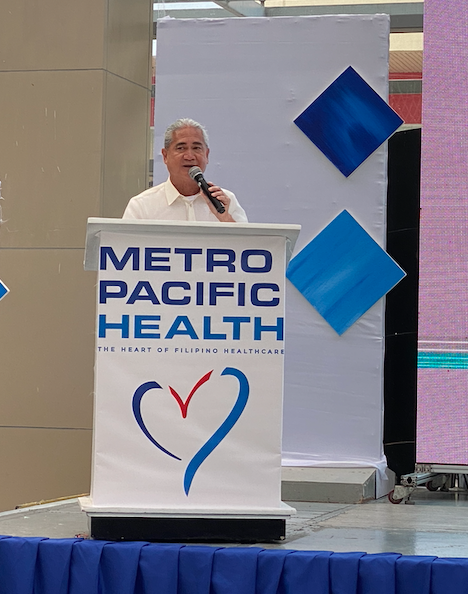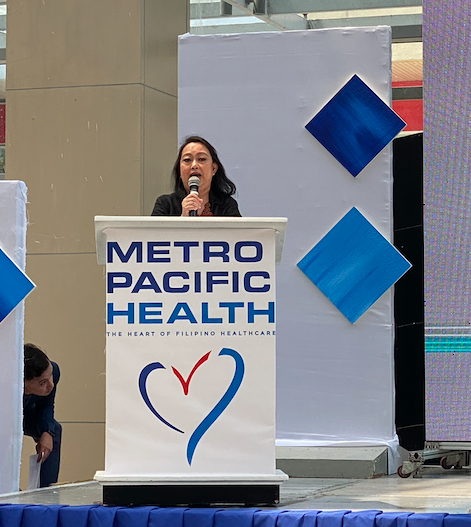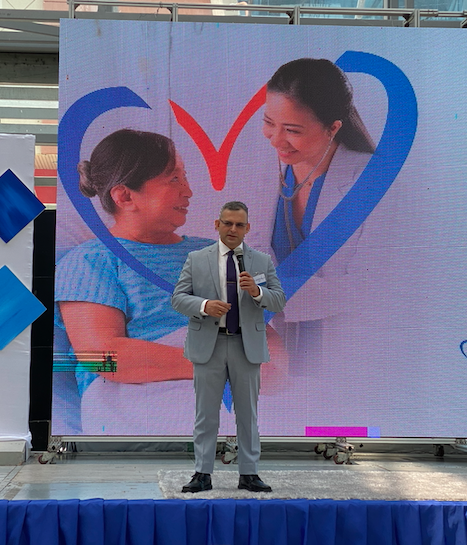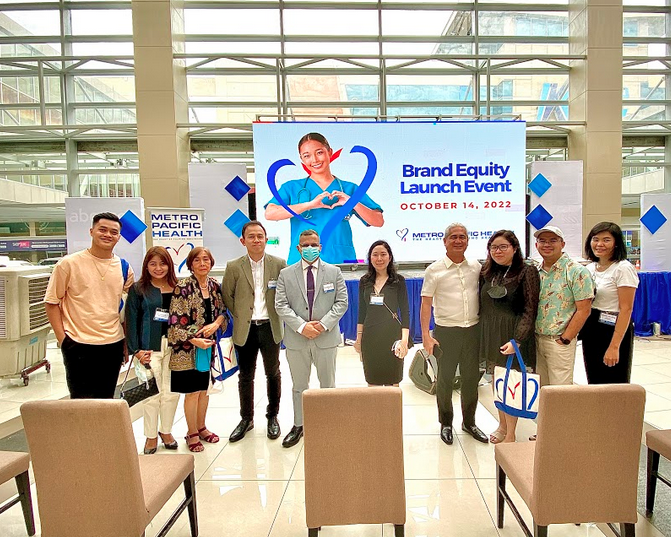Growing up in a family of doctors, I didn’t make a big deal out of healthcare. Both my parents and now my sister, despite being heroes of our land, especially during the pandemic, never acted like they were what they were when at home. Hence, my healthcare mindset was not really on point since I was a child. It may be why I was never interested in anything healthcare and pursued a career in its opposite sectors–media, sales, and marketing.
Like what everyone expected, I would have become a healthcare worker—but being a medical professional never interested me. In fact, during one of my summer breaks in high school, my mom hired me to assist her in her clinic (so that I won’t just watch TV all day at home). The job was to take her patients’ blood pressure, help her prepare her ampoules, and such. However, I did that for only one day!
My mother’s clinic was in transition then, so she was hiring new staff, and I ended up helping in the medicine corner (where the patients buy their supplements) instead. I was the one preparing the supplements (my mother was an Alternative medicine doctor at that time) and calculating all the costs per tablet or capsule, and I even handled the payments. There were two of us, but I can confidently say I was very good at my job. I worked faster than the official hired worker (she was already in her late 40s during that time and was happy that I was doing a lot of the work). Instead of doing a medical healthcare job, I ended up doing customer service and sales work, which I loved so much!
Most of the time, I’m indifferent about doing any healthcare-related stuff. As a freelance writer, I get tasked to write about technical health-related topics and to be honest; it’s my kryptonite. I always end up getting a lot of revisions from my editor. However, attending the Metro Pacific Health’s Brand Equity Launch Event in General Santos City was a breeze because I knew from the start that it was about Marketing. Marketing a hospital was unexpected and challenging, as Miss Bam Basan-Anino, one of the marketers for the Davao Doctors Hospital, said. That sparked my excitement for the event.
The Metro Pacific Health – Metro Pacific Hospital Holdings, Inc, or ‘MPHHI’
It was indeed refreshing to know that someone is marketing a hospital. Being invited to a media event for a hospital was a rare occurrence for me as a blogger. Apart from that, some people might even think it’s unnecessary to market a hospital. Like a funeral home business, people think hospitals always thrive, especially during a pandemic, but I found out that that’s not true for many hospitals (more about this later). Not to mention, the 19 hospitals and 22 outpatient care centers (the Davao Doctors Hospital is one of them) under Metro Pacific Health are the best and most trusted hospitals in the Philippines. However, I realized that promoting Metro Pacific Health was indeed essential.

Many people are unaware that Manny Pangilinan’s Metro Pacific Investments has invested in healthcare. Under its belt is Metro Pacific Health, a chain of the best hospitals in the country.
“It all started in 2007 when the Makati Medical Center had bank debt problems which threatened its ability to continue operating. Then-PLDT President Polly Nazareno underwent surgery at the hospital, and his doctor sought his advice, as Piltel had just successfully restructured their debts. Polly suggested they invite Manny Pangilinan to their Board and organized the meeting,” Augie Palisoc, Jr., Metro Pacific Health’s President, said.
The Makati Medical Center Board asked Mr. Manny V. Pangilinan (MVP) to be their Chairman. As MVP accepted, he also invested P 750 million in Makati Med.
“After turning around Makati Med, we challenged ourselves. If there were hospital chains in many other countries, why can’t we do the same in our own homeland? Thus started our quest to build the nationwide chain of hospitals in the Philippines, which is now Metro Pacific Hospital Holdings, Inc, or ‘MPHHI’,” added Mr. Palisoc.
The hospitals under MPHHI are Makati Medical Center, Cardinal Santos Medical Center, Riverside Medical Center, Our Lady of Lourdes Hospital, Asian Hospital and Medical Center, De Los Santos Medical Center, Central Luzon Doctors’ Hospital, West Metro Medical Center, Dr. Jesus C. Delgado Memorial Hospital, Manila Doctors Hospital, Sacred Heart Hospital of Malolos, Marikina Valley Medical Center, St. Elizabeth Hospital, Manuel J. Santos Hospital, Los Banos Doctors Hospital and Medical Center, Ramiro Community Hospital, Calamba Medical Center, Commonwealth Hospital and Medical Center, and our very own, Davao Doctors Hospital.
What’s great about having a chain of hospitals is that all of them are interconnected. Every time you go to one of the hospitals for whatever health reasons, and you need to be redirected to another partner hospital, or if you are just transferring to another place, your records will remain in the new hospital you’re visiting. All hospitals are under the same patient database. You don’t need to register again if you visit more than one hospital under MPHHI.
The Heart of Filipino Healthcare
Health is one of the most crucial aspects of our lives. As my friend Cess, who just survived cancer, has put it, “You can have everything–money, a thriving career–but if your health is on the downside, everything else won’t matter.” She’s right. Even if you have great relationships, your sickness would be daunting to your loved ones.
Cess had her Radiotherapy at the Davao Doctors Hospital (DDH), and I asked about her experience in the hospital. While she acknowledges the support of her family, friends, and boyfriend in her fight against cancer, she said that DDH became instrumental in her healing. She told me that all the staff was very caring and positive. This made her (and many other cancer patients in DDH) very hopeful about their situation.
More than the technical aspects of healing, I believe that loving care is the most important thing to give patients. Even if the hospital has the best-skilled workers and the most advanced equipment, if their workers show no care, empathy, and kindness, and leave their patients feeling pessimistic, then there’s no point in healing people and becoming health workers.

Mr. Avel Manansala of Gensan News Online and Sox Bloggers said that when he got confined in St. Elizabeth Hospital in General Santos City (one of the hospitals under Metro Pacific Health), he was treated with the utmost care, and that eventually led to his healing. He said that he was very thankful to the hospital.
Mr. Manansala’s sentiment made me more certain that all the 19 hospitals under MPHHI give their best in healing their patients not just physically but also emotionally. They really are serving people with a heart.
“Our business, ladies and gentlemen, is all about giving the best medical care science can offer and caring for our patients and their families with the kindness and empathy they deserve. When we do this right every single time, in every interaction, we create a small emotional bond… a precious one,” says Jessica Abaya, the chief marketer of Metro Pacific Health.
MPHHI’s Contribution to Society
As we were waiting to leave Davao for General Santos City for the MPHHI event, miss Bam Basan-Anino and I sat on one of the benches near the Radiotherapy station in DDH. Miss Bam discussed with me specific points regarding the rebranding of MPHHI. Above the technicalities she mentioned, one most stuck with me. She said that as a marketer, she felt great because her job gave her the chance to contribute to society. I was touched because even though we weren’t being dramatic about it, her words were poignant, and they spoke about her life’s purpose.
These days, many idealistic people continue to fight for other people’s rights, especially in marginalized and poor communities. Most of these people are ranting about their atrocities, and they’re not wrong. I absolutely agree with them, but I’ve begun to be more pragmatic about societal things because most of the time, I cannot control things happening to me; what more the things happening to others?
I discussed that idealism because when MPPHI says that they are the new heart of Filipino healthcare, an idealist would immediately think about welfare, and when they say welfare, they could mean “free.” Apart from that, MPPHI is owned by one of the richest fellows in the country, Manny V. Pangilinan (MVP). As I’ve said, I’ve been one of them in the past, and it’s easy to blame the rich people and the government. However, let me quote author Thomas Sowell on this: “Since this is an era when many people are concerned about “fairness” and “social justice,” what is your “fair share” of what someone else has worked for?”
While it’s true that there are a lot of corrupt politicians, evil propagandists, etc., there are also a lot of unproductive people who tend to blame others for their circumstances and mostly only focus on the bad stuff, as there are many people, like MPHHI doctors and miss Bam, who are working hard to make their own contributions to Society. The sad reality is that productive people are outnumbered.

When asked about whether Metro Pacific Health hospitals would allow patients with no money to be admitted or if they would give free medicines and other services to the poor, Dr. Harish Pillai, Metro Pacific Health’s CEO, said that they are trying their best, and even working with the government to make healthcare cheaper for all Filipinos.
Dr. Pillai reiterated that while we all have our own ideal views about what healthcare should be (like the best should be accessed by more people, even the poor), there is a harsh reality that we cannot counter in a snap of a finger.
Despite that, Dr. Pillai remains optimistic about healthcare in the Philippines. “There are so many opportunities to improve healthcare in the country, especially in making treatment more affordable and accessible. My personal dream as a clinician is for no Filipino to have to fly out of the country for world-class medical attention and for no Filipino to be deprived of quality medical care in their own country,” he said.

I admire Dr. Pillai, Ms. Jessica Abaya, Mr. Augie Palisoc, Ms. Bam Basan-Anino, and the rest of the MPHHI workers for working hard in their respective fields. While it’s true that, at the moment, MPHHI’s services are not accessible to many poor people, the people I mentioned do their best to be able to do so. They are working hand-in-hand with the government to provide the best healthcare to as many people as possible. They fully commit to their mission statements; one of which is, “We contribute to nation-building by enabling a healthier Philippines.”
Article by NeP-C Ledesma. Originally published on her personal blog, Nepushii, on October 16, 2022. This post uses a canonical link to not confuse Google with indexing.



